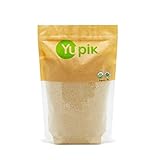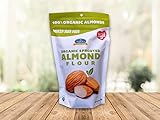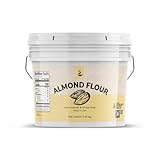Learn the health benefits of organic almond flour. This versatile ingredient, made from the finest almonds, is ideal for gluten-free baking and cooking.
Page Contents
What is Organic Almond Flour?
Organic almond flour is a fine powder derived from blanched almonds that have been finely pulverized. It is a popular gluten-free and low-carbohydrate baking ingredient since it provides a healthy, high-protein, and low-carbohydrate substitute for wheat flour.
It is manufactured from organic almonds, which implies they were cultivated without the use of synthetic pesticides, fertilizers, or other potentially dangerous chemicals. This is also non-GMO, which means it was created from almonds that were not genetically engineered.
It is suitable for a wide range of dishes, including cakes, cookies, bread, and other baked products. It’s also a popular seasoning in savory foods like breaded chicken or fish. Since almond flour lacks gluten, it might be difficult to utilize as a straight alternative for wheat flour in recipes that call for gluten.
Several recipes, however, have been designed particularly to utilize almond flour as a replacement, and it may be a tasty and nutritious option for individuals who are gluten intolerant or trying to lower their carbohydrate intake.
Nutritional Benefits
It is a high-nutritional-value ingredient with several health advantages. It has the following nutritional advantages:
- Protein-rich: Organic almond flour is high in protein, which is necessary for the body’s tissue construction and repair. One-quarter cup of organic almond flour has roughly 6 grams of protein
- It is a terrific low-carbohydrate alternative to wheat flour, making it a good choice for individuals limiting their carbohydrate consumption
- It contains a lot of healthful fats, including monounsaturated and polyunsaturated fats. These fats can aid in the reduction of inflammation, the reduction of cholesterol levels, and the improvement of heart health
- Vitamins and minerals: It contains a variety of vitamins and minerals, including vitamin E, magnesium, and potassium. These nutrients are necessary for optimum health and the prevention of chronic illnesses
- Gluten-free: Because this is naturally gluten-free, it is a good choice for individuals who have celiac disease or are gluten-sensitive
Overall, organic almond flour is a very nutritious item that may be an excellent complement to a balanced diet. It has various health benefits and may be used in place of standard wheat flour in many recipes.

Organic Almond Flour vs. Regular Almond Flour: What’s the Difference?
The primary distinction between organic and normal almond flour is how the almonds are farmed and processed.
It is manufactured from almonds cultivated using organic farming practices. This indicates that during the growing process, no synthetic pesticides, fertilizers, or other chemicals were utilized. This is also non-GMO, which means that the almonds used to create it were not genetically engineered.
Regular almond flour, on the other hand, is often manufactured from conventionally cultivated almonds that may have been treated with synthetic pesticides and fertilizers. Normal almond flour can also be created from genetically modified almonds.
Both organic and conventional almond flour have comparable nutritional values. Almond flour is abundant in protein, healthy fats, and important vitamins and minerals in both kinds. Yet, some individuals choose organic almond flour since it is manufactured from almonds cultivated in more ecologically friendly and sustainable ways.
We have another article in case you need more details Almond Flour Crust Recipe.
Buying Guide: Tips for Choosing the Best Organic Almond Flour
There are a few crucial elements to consider while selecting the best organic almond flour. Here are some pointers to help you select the best product:
- Check for organic certification: Make sure the almond flour you buy is organically certified by a respected certifying body. This assures that no synthetic pesticides, fertilizers, or other dangerous chemicals were used to cultivate the almonds
- Examine the component list: Ascertain that the sole component specified is almonds. Avoid almond flour items that have preservatives, fillers, or other additives
- Consider the texture: The texture of almond flour varies depending on how finely it is processed. Choose the texture that is suited for the recipe. Finely ground almond flour is ideal for delicate baked products such as cakes and pastries, whilst coarsely ground almond flour is ideal for bread and other substantial baked goods
- Examine the freshness: Be certain that the almond flour you use is fresh. Check the packaging for a sell-by date or indicators of rancidity, such as a sour or musty odor
- Take into account the brand’s reputation: Seek almond flour brands with a strong reputation for quality and customer satisfaction. Examine internet reviews and ratings to learn about other consumers’ experiences
- Prices should be compared: Organic almond flour might be more expensive than standard wheat flour or even conventional almond flour. Compare costs between brands and sizes to discover the best deal for your money
The Sustainability Production
The environmental effect of almond cultivation, water consumption, and pesticide and fertilizer use are all elements that influence the sustainability of organic almond flour manufacturing.
Almond production has a substantial environmental impact since it requires a lot of water, especially in drought-prone areas. Organic almond farming, on the other hand, may be more sustainable than conventional almond farming since it focuses on natural insect and weed management and does not use synthetic pesticides or fertilizers that might affect the soil and surrounding ecology.
Organic almond farming can also be more water-efficient than conventional almond farming since it frequently employs more efficient irrigation systems and prioritizes water conservation initiatives.
But, whether organic or conventional, almond cultivation can still have a detrimental influence on the environment, particularly when it comes to water consumption in drought-prone areas. To mitigate these consequences, almond producers must adopt sustainable measures such as effective water-saving technologies.
Generally, the sustainability of organic almond flour manufacturing is determined by a variety of circumstances, although it can be a more ecologically friendly alternative than regular almond flour manufacturing.
Potential Side Effects and Precautions of Consuming Organic Almond Flour
Most people believe organic almond flour to be safe to ingest. There are, however, a few potential negative effects and measures to be aware of:
- Allergies: Because almond flour is manufactured from pulverized almonds, persons who are sensitive to tree nuts may experience adverse responses. Avoid almond flour if you have a known allergy to almonds or other tree nuts
- Digestive problems: Almond flour has a lot of fiber, which can create digestive problems in some individuals, especially if they eat a lot of it. To minimize intestinal pain, start with little amounts of almond flour and gradually increase your intake
- Oxalates: Almonds and almond flour contain oxalates, which in certain persons might lead to the production of kidney stones. If you are prone to kidney stones, you should limit your use of almond flour
- Caloric density: Since almond flour contains a lot of calories and fat, it should be used in moderation as part of a healthy diet
- Contamination: If organic almond flour is not handled and kept correctly, it might get contaminated with germs such as salmonella. To preserve freshness, store almond flour in an airtight container in a cold, dry area and verify the sell-by date
How to Use it in Baking And Cooking
Organic almond flour is an adaptable ingredient that can be used in a wide range of baking and culinary dishes. These are some recipes that utilize almond flour:
- It is an excellent substitute for wheat flour in many baked items. It is used in a variety of dishes, including cookies, cakes, and muffins. Almond flour has a somewhat nutty taste and gives baked items a moist, delicate texture
- Breading and coating: Almond flour can be used as a gluten-free substitute for breadcrumbs in breaded chicken or fish dishes. It may also be used to coat vegetables before baking or frying, such as zucchini or eggplant
- Pancakes and waffles: Almond flour may be substituted for wheat flour in pancake and waffle recipes. It gives the pancakes or waffles a nutty taste and makes them soft and fluffy
- Pizza crust: To produce a gluten-free pizza crust, use almond flour. It is mixed with eggs, cheese, and spices to form a dough that can be stretched out and covered with sauce, cheese, and other toppings
- Thickener: Almond flour may be used to make sauces, soups, and gravies thicker. It imparts a nutty taste and thickens the liquid without the use of cornflour or flour

Conclusion
Finally, it is a healthy and flexible product that may be utilized in a wide range of baking and cooking dishes. It is abundant in protein, healthy fats, and fiber, making it an excellent choice for gluten-free or low-carb diets.
It is crucial to be aware of the potential side effects and precautions, such as allergies and digestive disorders, while ingesting almond flour, and to use it in moderation as part of a balanced diet. You may enjoy the delicious and healthful advantages of organic almond flour in your regular cooking and baking by keeping these suggestions in mind.
We have more related articles,
- How to Grow Hydroponic Strawberries?
- Savor the Smoothness of Organic Almond Butter on Your Tongue
- The Best Almond Flour Fried Chicken For You
- Nourish your Body with Organic Almond Milk – With Complete Guidance
FAQs
While you can use almond flour in place of all-purpose flour in many recipes, it is important to note that almond flour has a different texture and moisture content, so it may not work in all recipes. It is best to experiment with small batches to see how almond flour works in a particular recipe.
Yes, you can substitute almond flour for wheat flour in many recipes, but it is not a 1:1 substitute. Almond flour has a different texture and moisture content, so you may need to adjust the recipe accordingly.
Yes, organic almond flour is gluten-free and a great option for those with gluten sensitivities or celiac disease.
Organic almond flour is higher in protein, healthy fats, and fiber than wheat flour, making it a healthier option. It is also lower in carbohydrates and has a lower glycemic index.











